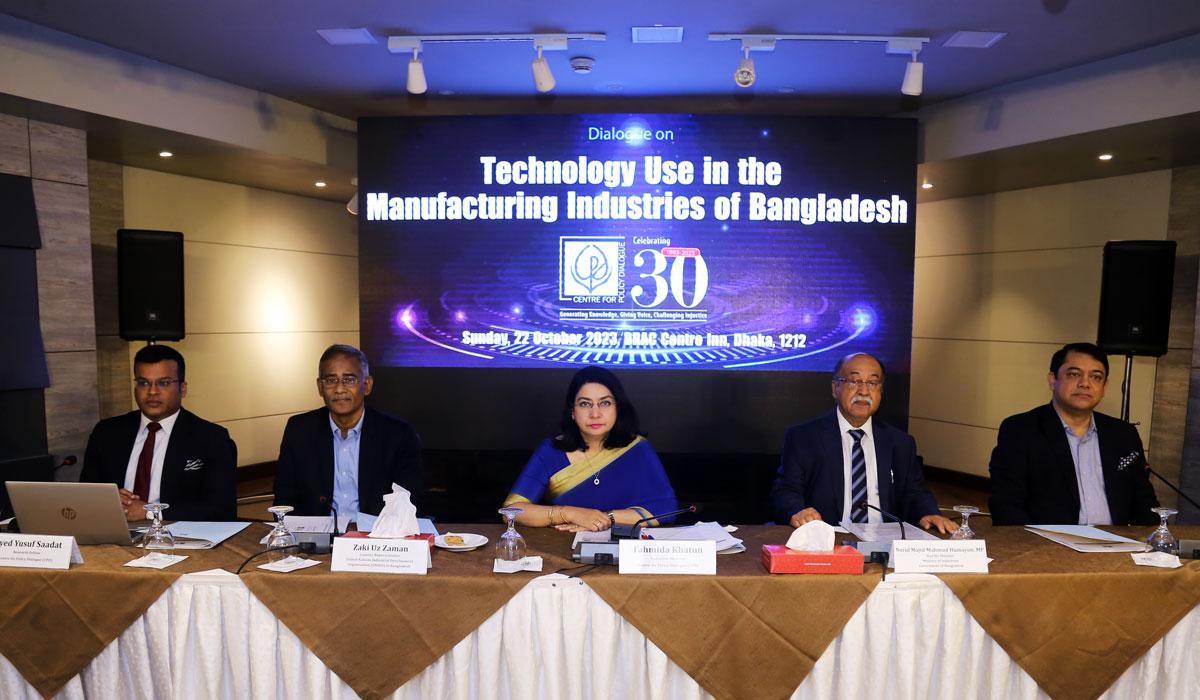
In FY2021-22, the manufacturing sector in Bangladesh accounted for 24.29 per cent of the Gross Domestic Product (GDP), highlighting its importance in the country’s economy. Despite its continued significance to GDP growth, the sector faces challenges like heavy reliance on labour, limited connectivity, and inadequate Information Technology (IT) infrastructure, further compounded by shifting global trade patterns. Moreover, while the sector predominantly focuses on low-tech products, its declining contribution to total employment underscores the need for efforts to enhance production capacity and foster job creation.
Most manufacturing firms across the country lack websites, indicating an opportunity for growth and emphasising the importance of increased digitisation efforts, especially for small and medium-sized enterprises. Businesses involved in global trade tend to adopt digital tools, highlighting the need for a strong online presence in international commerce. Companies with a higher percentage of educated workers show a greater inclination to embrace technology, indicating the value of investing in education and skill development to promote broader digitisation in the manufacturing sector.
Most sales remain tied to traditional channels, offering firms a chance to grow their online presence and tap into the rising e-commerce wave. Additionally, there is a need for a more comprehensive Research and Development (R&D) strategy and increased investment in innovation to enhance competitiveness.
These were some of the findings of the study titled ‘Technology Use in the Manufacturing Industries of Bangladesh’ which was an exploratory analysis conducted by the Centre for Policy Dialogue (CPD). Based on this study, a dialogue was organised by CPD on Sunday, 22 October 2023 at the BRAC Centre Inn, Dhaka.
Dr Fahmida Khatun, Executive Director, CPD, chaired the session and said, ‘Technology serves as a crucial tool for manufacturers, empowering them to enhance output, efficiency, and ultimately gain a competitive edge in productivity.’
In his keynote presentation, Mr Syed Yusuf Saadat, Research Fellow, CPD, recommended to empower workers by investing in science, technology, engineering, and mathematics (STEM) education and technical training, keeping their skills updated, and building core technical and organisational capacity at the management level.
While providing recommendations for expanding support to Small and Medium-sized enterprises (SMEs), he urged ‘The awareness of SMEs regarding available government schemes should be increased, along with a concerted effort to explain how these schemes can facilitate the adoption of new technologies by firms.
He emphasised ‘Access to finance for technology adoption by firms can be facilitated by enhancing the capacity of the banking sector to allocate credit efficiently and inclusively to firms of all sizes.’ He also said that the technology targeted grants and fiscal incentives should be provided to promote innovation.
To engage international partners, the technical capacity of medium and high-tech industries should be built to transform them into exporting firms. The big-tech Multinational Corporations (MNCs) should be encouraged to open offices in Bangladesh so that they can disperse technology along the supply chain.
‘To ensure a conducive environment for investment, it is vital to advance technical infrastructure, offer high-speed internet access at affordable rates, and sustain a reliable power supply’ said the Research Fellow. He also mentioned the importance of reducing uncertainties at the macro level by avoiding frequent changes in energy policies and fuel prices.
To establish a knowledge-driven economy, it is essential to increase government and private sector investment in R&D, enhance university research facilities for manufacturing technology innovations, and shift the focus from low-wage competition to productivity-driven innovation.
The Chief Guest, Mr Nurul Majid Mahmud Humayun, MP, Hon’ble Minister, Ministry of Industries, Government of Bangladesh, said ‘It is essential to assess skill and expertise requirements on a sector-specific basis and provide tailored training to workers. This approach will help to ensure a smooth and rapid transition to high-tech industries’.
‘When comparing Bangladesh to other countries in terms of value added manufacturing, it was revealed that there has been a significant 12 per cent increase over the past 22 years, which is the highest among SAARC nations.’ said Mr Zaki Uz Zaman, Country Representative, United Nations Industrial Development Organisation (UNIDO). However, the per capita manufacturing value added in Bangladesh still lags behind Thailand and Vietnam. Additionally, Bangladesh falls behind in the percentage of high-tech industries compared to its neighboring countries. Therefore, there is a huge scope of increasing the number of high-tech industries in Bangladesh.
While discussing job losses due to the adoption of technologies, Mr Syed Almas Kabir, President of the Bangladesh-Malaysia Chamber of Commerce & Industry, stated, ‘According to a survey by Aspire to Innovate (a2i), it was observed that by 2040, job losses are projected to reach 60 per cent in the RMG and furniture sectors, 40 per cent in agriculture and the food industry, 35 per cent in leather industries, and 20 per cent in tourism, potentially leading to 55 lakh job losses. However, technology adoption will also generate new employment opportunities. Therefore, we must ensure that those who lose their jobs can transition to these new roles through training.’
In the open floor discussion, the participants highlighted that financial constraints make it difficult for SMEs to invest in high-tech machinery, potentially forcing them to stick to traditional technologies. Establishing shared facilities for multiple SMEs to access expensive machinery could help address this issue. Additionally, the private sector should invest more in worker skill development during the transition to high-tech solutions. Initiatives should be taken to boost the contribution of industries in exports beyond just the RMG sector.
High-level policymakers, political leaders, academics, development practitioners, civil society activists, and journalists attended the dialogue and shared their valuable insights.


